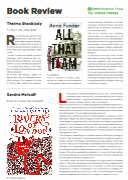Book Review Oxfam Bookshop, Olney Tel: 01234 714592 that they had been betrayed by one of their own group. Loved and trusted, they were suborned by the Nazis and persuaded to hand over their friends. This is an intricate novel, requiring concentration, not least because of its episodic nature, as various characters report the events and the chronology is not always clear. However, it is well wo h the effort, as it brings a watershed in history vividly to life, seen through the eyes of those who lived through it. In sources at the back, Anna Funder describes her novel as being 'reconstructed from fossil fragments, much as you might draw skin and feathers over an assembly of dinosaur bones, to fully see the beast.' What an accurate description of this tale. The novel provides a fascinating yet chilling insight into what can happen when extremists ofanyregimearegivenabsolutepower.This is a good and worthwhile read for those long summer days in August. Thelma Shacklady R That I Am, Anna Funder uth was the only one left of her friends living in Germany when Hitler came into power. Decades later, and as an old, frail woman in the 21stcentury, she appears throughout the novel, recalling the tragic events that formed her life. The other chapters are headed by various characters, whose stories are also told. Some, like Ruth, are based on real people and their accounts are historically accurate. This includes Dora Fabian, Ernst Toller, Be hold Jacob and Hans Wesemann, while others are fictional. All of them fled Germany before the SecondWorldWarandattemptedtowarn other countries of the dangers of the rise of Fascism. Many ignored their warnings, Sandra Metcalf vers of London, Ben Aaronovitch Anna Funder A including Britain. They all suffered in various ways - imprisonment, threats, insults and intimidation - but the greatest tragedy was the realisation Lefttoguardacrimesceneoutsidetheactors'churchinCoventGarden in the early hours of the morning, Constable Peter Grant encounters a witness. However, trying to take a statement from him proves difficult as the man has been dead for more than a century. About to come to the end of his probationary period with the Metropolitan Police, Grant is expecting to be assigned to the Case Progression Unit, which is a desk job and the last thing he wants. But his conversation with a ghost and a meeting with chief inspector Thomas Nightingale changes all that. Suddenly, he's a member of a police unit that few people know exists and nobody talks about. Despite his science background Grant has become, to all intents and purposes, an apprentice wizard, enduring the kind of apprenticeship which needs lots of hard perseverance to discover whether you can master some very strange but useful technique. Rather than the facile waving of a magic wand, they learn to hunt someone or something which is driving people to commit the most appalling crimes. The novel has an entertaining sub-plot which creates a kind of new mythology for London's rivers, involving a 'turf war' between a group of people who personify the tidal reaches of the Thames, and another group who represent those rivers beyond it. This can sometimes feels a bit detached from the main action and can seem like a complication too far in what is already a complex plot, but it does develop some interesting characters and it emphasises London's role in the story. The bustling metropolis is a character in this book not simply a setting. Its history and ghosts are as much a part of its life as its modern buildings and the 21st century methods of its police force. The writing is witty and quirky with shades of Douglas Adams (of blessed memory). The action moves quickly and Grant is a cynical but engaging central character, alongside Nightingale, who is enigmatic, and the more bracing personality of Dr Walid, the pathologist. So, if you're tired of vampire-porn masquerading as fantasy, try sinking your teeth into something which displays some real imagination and invention and, thankfully, a sense of humour. 28 Phonebox Magazine
